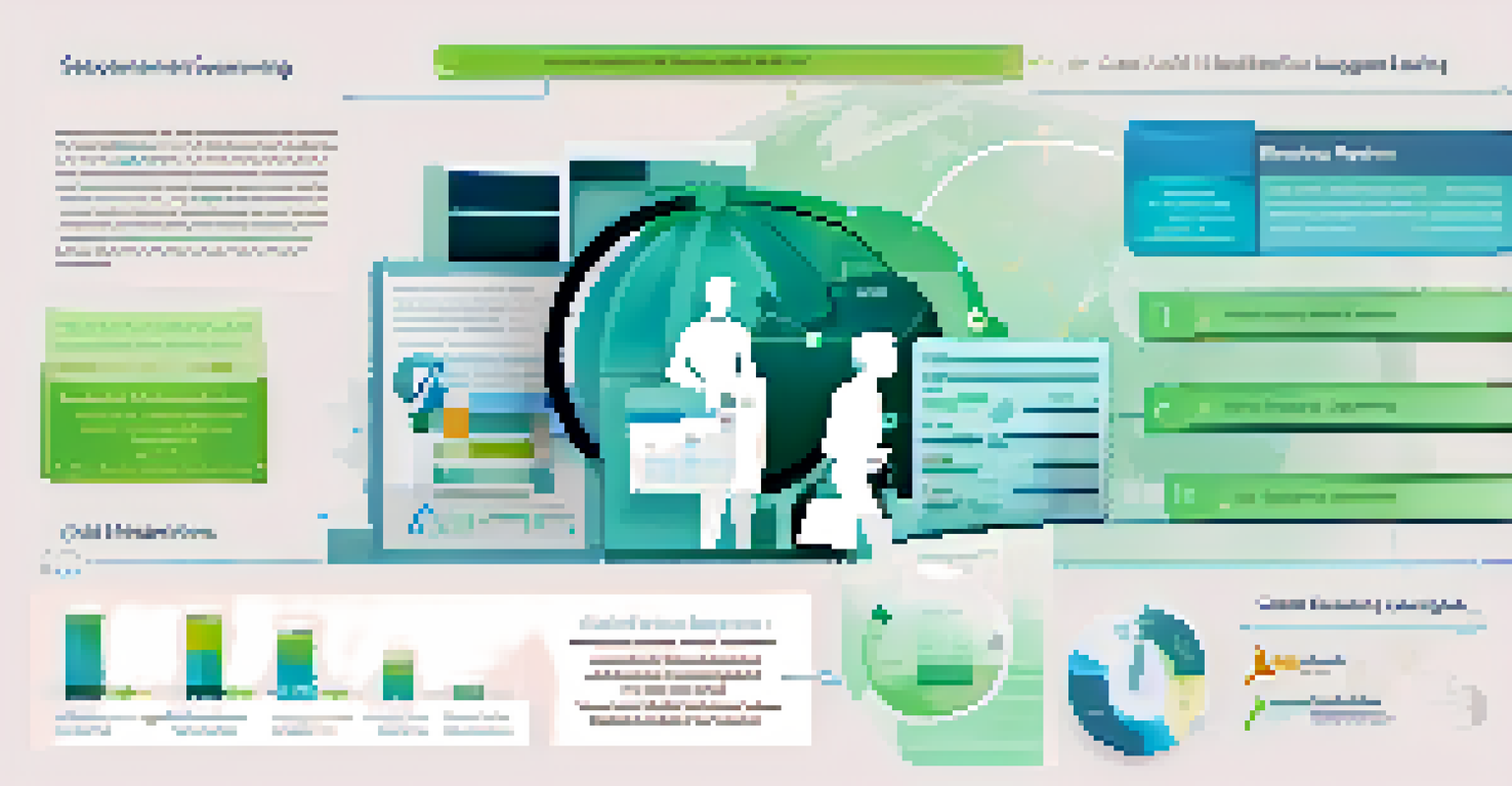The Role of Learning Analytics in Adult Education

Understanding Learning Analytics in Adult Education
Learning analytics refers to the measurement, collection, analysis, and reporting of data about learners and their contexts. In adult education, it plays a crucial role in understanding how students engage with their learning materials and environments. By analyzing this data, educators can tailor their teaching methods to better meet the needs of adult learners.
Data is the new oil. It’s valuable, but if unrefined it cannot really be used.
This approach helps identify patterns in learning behaviors, such as which resources are most effective or where learners struggle. Unlike traditional education, where a one-size-fits-all approach often prevails, learning analytics allows for a more personalized learning experience. This way, adult learners can receive the support they need to succeed.
Furthermore, learning analytics can reveal insights into how different demographics engage with content, allowing for the development of targeted interventions. This means that educators can create a more inclusive environment, catering to various backgrounds and learning styles.
Enhancing Learner Engagement Through Data Insights
One of the most significant advantages of learning analytics is its ability to enhance learner engagement. By providing insights into how learners interact with course content, educators can identify students who may be at risk of disengagement. This proactive approach allows instructors to intervene early, offering additional support or resources.

For instance, if data indicates that a specific module has a high dropout rate, educators can investigate the reasons behind it. They might find that the content is too challenging or not engaging enough. Armed with this knowledge, they can adjust the curriculum to better resonate with their learners, ultimately fostering a more engaging educational experience.
Personalized Learning for Adults
Learning analytics enables educators to create customized learning paths that cater to the unique needs and backgrounds of adult learners.
Moreover, analytics tools can facilitate personalized feedback for adult learners, which is essential for motivation. When students receive timely and constructive feedback based on their unique learning patterns, they are more likely to stay motivated and engaged in their educational journey.
Personalized Learning Paths for Adult Learners
The ability to create personalized learning paths is another significant benefit of learning analytics. Adult learners often have different backgrounds, experiences, and goals, making a customized approach essential. By analyzing individual data, educators can design learning experiences that cater specifically to each learner's needs.
You can’t improve what you don’t measure.
For example, if a learner excels in certain areas but struggles in others, educators can curate a tailored learning path that emphasizes their strengths while addressing weaknesses. This targeted approach not only boosts confidence but also enhances overall learning outcomes.
Additionally, personalized learning paths can help adult learners balance their studies with other responsibilities, such as work or family. By providing flexibility in how and when they learn, educators can create a more accommodating environment that respects the complexities of adult life.
Tracking Progress and Accountability in Learning
Learning analytics also plays a vital role in tracking student progress, fostering a sense of accountability. With data-driven insights, both learners and educators can monitor how well students are meeting their learning objectives. This transparency is crucial in adult education, where self-motivation and accountability are key to success.
For instance, dashboards that display learners' progress can provide a visual representation of their achievements and areas for improvement. This not only empowers learners to take charge of their education but also encourages them to set specific goals and milestones.
Enhancing Engagement with Data
By using data insights, educators can identify at-risk students and adjust their teaching strategies to foster greater engagement and motivation.
Moreover, tracking progress through analytics can facilitate meaningful conversations between educators and learners. Regular discussions about data insights can help reinforce a collaborative approach to learning, where both parties work together to achieve educational goals.
Identifying Trends and Improving Curriculum Design
Learning analytics can help educators identify trends and patterns that inform curriculum design. By analyzing data across multiple cohorts, educators can discern which teaching methods and content resonate best with adult learners. This information is invaluable for ongoing program improvement.
For example, if analytics show that a particular course consistently results in high assessments but low engagement, instructors might consider restructuring the course. They could incorporate more interactive elements or real-world applications to enhance engagement.
As a result, continuous improvement becomes part of the educational process, fostering an environment where curriculum evolves to meet the changing needs of adult learners. This adaptability ensures that educational programs remain relevant and effective.
Supporting Diverse Learning Needs Through Analytics
In adult education, learners come from diverse backgrounds and have varied learning needs. Learning analytics can help educators recognize these differences and adapt their teaching strategies accordingly. By analyzing data related to demographic factors, educators can develop more inclusive programs.
For instance, if analytics reveal that non-native speakers struggle with specific content, educators can create additional resources tailored to their language needs. This proactive approach fosters an inclusive learning environment where all students feel supported.
Ethics in Learning Analytics
While beneficial, learning analytics must be implemented with careful consideration of data privacy and the human aspect of teaching.
Additionally, understanding the diverse needs of learners can help educators implement universal design principles in their curriculum. This ensures that all learners have equal access to learning opportunities, regardless of their individual challenges.
Challenges and Ethical Considerations in Learning Analytics
While learning analytics offers numerous benefits, it also presents challenges and ethical considerations that must be addressed. Issues such as data privacy and security are paramount, as educators must ensure that learners' personal information is protected. Transparency in how data is collected and used is essential to building trust.
Moreover, there is the risk of over-reliance on data, which might lead educators to overlook the human element of teaching. While analytics can provide valuable insights, they should complement, not replace, the educator's intuition and experience.

Balancing the use of data with ethical considerations is vital for fostering a positive learning environment. By prioritizing ethical data practices, educators can harness the power of learning analytics while respecting learners' rights and dignity.
The Future of Learning Analytics in Adult Education
As technology continues to advance, the role of learning analytics in adult education is expected to grow even further. With the rise of artificial intelligence and machine learning, educators will have access to more sophisticated tools for analyzing learner data. This evolution promises to enhance personalization and engagement in unprecedented ways.
For example, predictive analytics could identify learners at risk of dropping out before it happens, allowing for timely interventions. This proactive approach could drastically improve retention rates and overall success in adult education programs.
Looking ahead, the integration of learning analytics into adult education will likely reshape how educators design and deliver programs. Embracing these advancements can lead to more effective and responsive educational experiences for adult learners, ultimately empowering them to achieve their goals.